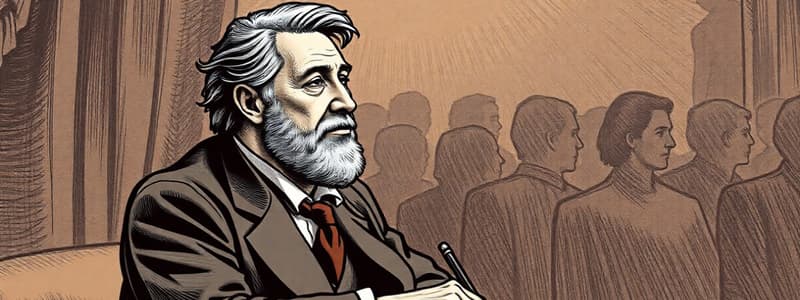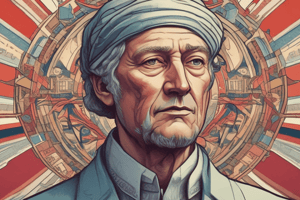Podcast
Questions and Answers
What does Oakeshott critique in his philosophy of experience?
What does Oakeshott critique in his philosophy of experience?
- The reduction of human life to rational perspectives (correct)
- The role of divine rights in governance
- The importance of personal autonomy
- The necessity of ideological frameworks in politics
What is the primary source of political authority according to Joseph de Maistre?
What is the primary source of political authority according to Joseph de Maistre?
- Papal authority derived from divine right (correct)
- Human agreements and contracts
- Economic stability and prosperity
- The will of the majority
How does Benjamin Disraeli's approach differ from traditional conservatism?
How does Benjamin Disraeli's approach differ from traditional conservatism?
- By promoting radical socialism
- By rejecting any form of reform
- By advocating for social unity through strategic reforms (correct)
- By emphasizing individualism over collectivism
What is a central belief of Emma Goldman regarding authority?
What is a central belief of Emma Goldman regarding authority?
What does Oakeshott believe is essential in the political sphere?
What does Oakeshott believe is essential in the political sphere?
Which concept is central to Goldman's philosophy?
Which concept is central to Goldman's philosophy?
How did Benjamin Disraeli view the role of the elite in society?
How did Benjamin Disraeli view the role of the elite in society?
What does the term 'One-Nation Conservatism' represent in Disraeli's philosophy?
What does the term 'One-Nation Conservatism' represent in Disraeli's philosophy?
Flashcards
Oakeshott's Conservatism
Oakeshott's Conservatism
Focuses on practical knowledge, tradition, and gradual change over rigid ideologies in politics.
Oakeshott's Critique of Rationalism
Oakeshott's Critique of Rationalism
Argues that politics can't be solely determined by reason or expert knowledge, but depends on practical wisdom and tradition.
Maistre's Conservatism
Maistre's Conservatism
A form of conservatism emphasizing divine right, centralized power, and opposition to social contract theories.
Disraeli's Conservatism
Disraeli's Conservatism
Signup and view all the flashcards
Goldman's Anarchism
Goldman's Anarchism
Signup and view all the flashcards
Critique of Ideology (Oakeshott)
Critique of Ideology (Oakeshott)
Signup and view all the flashcards
Role of Tradition (Oakeshott)
Role of Tradition (Oakeshott)
Signup and view all the flashcards
Social Justice (Goldman)
Social Justice (Goldman)
Signup and view all the flashcards
Study Notes
Michael Oakeshott: Conservatism
- Human experience is diverse, encompassing scientific, historical, practical, and philosophical perspectives.
- Criticized reducing human life to purely rational or scientific viewpoints.
- Politics cannot be solely guided by reason or expert knowledge.
- Advocated for traditions and practical knowledge over rigid, ideological frameworks.
- Emphasized gradual, evolutionary change within inherited traditions.
- Viewed politics as negotiation and compromise, not ideological vision-building.
- Believed ideologies oversimplify human complexities and ignore practical wisdom.
Joseph de Maistre: Authoritarian Conservatism
- The Pope holds ultimate spiritual and temporal power, derived from divine right.
- Rejected social contract theories, asserting political authority originates in divine providence.
- Advocated for centralized, undivided sovereignty for societal stability.
- Emphasized that legitimate governance aligns with divine and moral principles.
Benjamin Disraeli: Paternalistic Conservatism
- Balanced conservative principles with strategic reforms, including expanding suffrage to the working class.
- Advocated for a unified society through his "One-Nation Conservatism" philosophy.
- Supported the expansion of the British Empire as crucial for national power.
Emma Goldman: Anarchism
- Opposed state control and organized religion as inherently oppressive.
- Argued that democracy often disregards minority rights.
- Emphasized personal freedom, rejecting coercive societal structures.
- Believed true freedom requires ensuring equality, particularly advocating for women's rights.
- Advocated for direct resistance and mutual aid as methods to dismantle injustice.
Mikhail Bakunin: Anarchism
- Opposed all forms of centralized authority (political, religious, and social) as oppressive.
- Advocated for the abolition of the state and hierarchies, aiming for a society based on voluntary cooperation.
- Emphasized individual liberty and believed in economic and social autonomy through decentralized self-governance.
- Supported direct action, underground movements, and decentralized worker cooperatives.
- Envisioned a society based on mutual aid, solidarity, and the absence of political domination.
Studying That Suits You
Use AI to generate personalized quizzes and flashcards to suit your learning preferences.
Related Documents
Description
Explore the contrasting views of Michael Oakeshott and Joseph de Maistre on conservatism. This quiz delves into Oakeshott's emphasis on tradition and practical knowledge versus de Maistre's authoritarian perspective rooted in divine authority. Test your understanding of these influential political thinkers.




